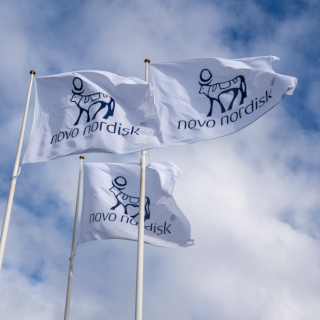
Novo Nordisk announced results from the Phase III REDEFINE 1 trial for its investigational obesity therapy, CagriSema. The therapy, a combination of semaglutide and cagrilintide, demonstrated superior weight-loss outcomes compared to monotherapy with its individual components or placebo. Patients receiving CagriSema achieved an average weight reduction of 22.7% after 68 weeks, significantly surpassing the weight-loss achieved by semaglutide alone (16.1%) or cagrilintide alone (11.8%).
However, the results fell short of the 25% weight-loss benchmark set by Novo Nordisk executives based on prior studies, leading to a steep 20% drop in the company’s stock value. Analysts noted the flexible dosing protocol may have contributed to the shortfall, as only 57% of patients reached the highest dose of CagriSema, compared to 82.5% and 70.2% in the cagrilintide and semaglutide groups. The lower percentage of patients reaching the maximum CagriSema dose suggests that the full weight loss potential of the drug may not have been realized. The flexible dosing schedule created inconsistency in the study, making it difficult to determine CagriSema’s optimal performance. Despite this, 40% of participants on CagriSema achieved at least a 25% weight reduction, demonstrating its potential as a viable treatment.
The results show that CagriSema is competitive with Eli Lilly’s Zepbound (tirzepatide), which achieved weight-loss results of 22.5% in similar trials. However, investor sentiment was negative. There's increasing intolerance for even slight underperformance in the highly competitive and rapidly expanding obesity treatment market.
Dr. Robert Gabbay of Harvard Medical School, in a post on LinkedIn view the results as a significant step forward, despite the market reaction. He remarked that weight-loss medications achieving a 10% weight reduction were considered thrilling just a few years ago.
Dr. Gabbay’s observation about investor disappointment shows a growing issue in obesity treatment: unrealistic expectations. While CagriSema’s results are impressive, the market's disproportionately negative reaction demonstrates the need for measured communication and realistic projections. Despite surpassing historical benchmarks, the focus remains on managing inflated expectations, especially as the field advances rapidly.
Novo Nordisk remains optimistic about CagriSema’s future, with additional trial data expected in 2025. The company plans to refine its approach based on insights from REDEFINE 1, particularly to explore strategies for improving dose adherence.
For more information, please visit Fierce Biotech or BioSpace.








